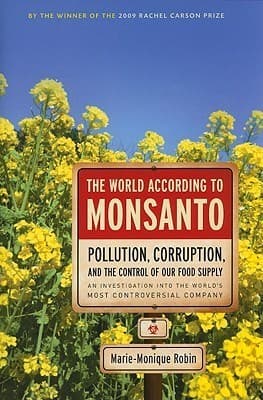
Book Review Summary: The World According to Monsanto: Pollution, Corruption, and the Control of the World's Food Supply
Introduction
"The World According to Monsanto: Pollution, Corruption, and the Control of the World's Food Supply" by Marie-Monique Robin is a gripping exposé that delves into the dark side of the agribusiness giant Monsanto. This comprehensive investigation uncovers the company's history of manufacturing hazardous chemicals and lethal herbicides, as well as its recent efforts to market itself as a "life sciences" company. Through meticulous research and compelling storytelling, Robin sheds light on Monsanto's alarming legal and political tactics to maintain its monopoly over the world's genetically modified corn and soy. This book is sure to challenge readers' perceptions of food safety and corporate control of the global food supply.
About Marie-Monique Robin
Marie-Monique Robin is a renowned French TV journalist and documentary filmmaker. Her work has been recognized with numerous awards, including the prestigious Albert Londres Prize for her investigation into organ theft in "Voleurs d'yeux." In "Le monde selon Monsanto," Robin delved into the world of Monsanto and its challenges to the environment, shedding light on the company's controversial products and practices. Her dedication to uncovering truth and holding powerful corporations accountable has made her a respected voice in the world of investigative journalism.
Analysis of Views
- Harmful Legacy: Readers are shocked to learn about Monsanto's past involvement in producing hazardous chemicals such as PCBs, dioxins, and Agent Orange. These toxic products have caused widespread harm and pollution, raising concerns about the company's long-term impact on human health and the environment.
- Corporate Control: The book highlights Monsanto's monopoly over the world's genetically modified corn and soy, which are found in over 95% of American households. This dominant position raises questions about corporate control over the global food supply and the potential consequences for food safety and sustainability.
- Political Influence: Readers are appalled by Monsanto's alleged influence on regulatory agencies such as the FDA and EPA. The revolving door between Monsanto executives and government officials is seen as a major concern, as it raises questions about the impartiality of regulatory bodies and their ability to protect public health.
- Environmental Concerns: The book highlights Monsanto's role in promoting genetically modified organisms (GMOs) and its impact on biodiversity and ecosystems. Readers express concerns about the potential long-term effects of GMOs on the environment and the potential consequences for food security in developing countries.
- Health Implications: The book raises concerns about the safety of Monsanto's products, including Roundup, a widely used herbicide. Readers express concern about the potential health risks associated with exposure to Roundup and its impact on human health, particularly in relation to cancer and other diseases.
Reasons for Recommendation
- In-depth Investigation: The book offers a comprehensive investigation into Monsanto's history, practices, and impact on the world. Readers appreciate the meticulous research and attention to detail that goes into uncovering the truth about this powerful corporation.
- Important Topic: The book addresses a critical issue related to food safety, corporate control, and environmental sustainability. Readers feel that it is essential to understand the role of companies like Monsanto in shaping our food supply and the potential consequences for public health and the environment.
- Engaging Storytelling: Despite its dense content, the book is praised for its engaging storytelling style. Readers appreciate how Robin weaves together compelling narratives and personal stories to bring the issues to life, making it accessible even for those who may not be familiar with the subject matter.
Reasons for Not Recommendation
- Dry Writing Style: Some readers find the book's writing style dry and overwhelmingly detailed, making it challenging to read through at times. They suggest that a more engaging writing style could have made the book more accessible and enjoyable for a wider audience.
- Lack of Balance: A few readers express disappointment that the book presents a one-sided view of Monsanto without exploring alternative perspectives or presenting counterarguments. They feel that a more balanced approach would have provided a more nuanced understanding of the complex issues surrounding corporate power and food production.
Conclusion
"The World According to Monsanto: Pollution, Corruption, and the Control of the World's Food Supply" by Marie-Monique Robin is a thought-provoking book that exposes the dark side of one of the world's most powerful corporations. Through meticulous research and compelling storytelling, Robin sheds light on Monsanto's history of pollution, corruption, and control over the global food supply. While some readers find the book challenging due to its dense content and dry writing style, others appreciate its in-depth investigation into this critical issue. Overall, this book is highly recommended for those interested in understanding the complexities of corporate power, food safety, and environmental sustainability in today's world.